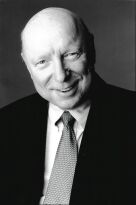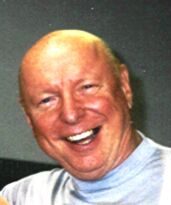XVR27's Improv Interviews - Don S. Davis - Improv
Whose Improv Is It Anyway? : Original On-The-Spot Satire
An Interview With Don S. Davis


Improv-Specific Questions & Answers
ChivalRuss: What is your opinion of improv as an art form versus improv as an
acting tool?
Don S. Davis: One of the problems that I have with improv as an art form is, and
I don't have any problems with improv as a tool, every actor has to improv. I did a scene in "Con Air" in which I had just washed my car and I was stopped at
an intersection. As I pulled out of the intersection, a body fell out of an airplane and hit my hood and other than the
lines scripted at me sitting there as I pulled forward, nothing had been scripted. Everything from that point was ad
lib and years of learning how to think about this character, the character and the way he would have said those lines
that were scripted were the keys to me improving. And the director liked what I did and audiences think it's funny that
have seen it. But since the thing, I've realized that what would have gotten me a better reaction would've been if I
had simply, all of this carnage that results and with the body falling from the sky, if I had simply screamed, "It
wasn't my fault!", but that didn't occur to me. Now, Ryan
Stiles and these guys on "Whose Line Is It Anyway?", that's the first thing that they would have said. "It wasn't
my fault!" Y'know, and that's the key to a good improv person, and that is how it helps you as an actor. But, when you
watch these guys doing improv, really ninety percent of the time, improv actors are doing it for comic effect. They're
doing a reaction to a cue or a clue that's been given and to comic effect. They're not doing it to cause any emotion
other than laughing. Whereas improv to carry a play, even if it's a comedy, it has to carry all emotions. So you work
out... and basically that's what the rehearsal process is in a play. That's why they rehearse a play for four weeks.
In professional theater, you'll never rehearse less than four weeks. I'm looking at Jo [Don's assistant for the
convention] because she's a trained theater person as I am. You would never put on a performance that you hadn't
rehearsed, and during the rehearsal period, that's when you're improving with the other actors, and the director is back
there sitting in the dark saying, "Yeah, I liked that." And when you do notes at the end of the rehearsal, he'll say,
"Y'know, I really loved what you did there.", "That stunk.", "Get rid of that.", "Find something else.", and in that way
the actors improv, because you're bringing something new to it that you dreamed up yourself, but you're bringing it as
an honest reaction to the activity in the scene.
ChivalRuss: In effect, that becomes part of the writing process.
Don S. Davis: Sure it does. The play scripts you buy from Samuel French, that's all they are is an improv situation that's been
copied down.
ChivalRuss: Have you done any improv?
Don S. Davis: I haven't done a lot of improv, no. I've had very... I had a
rigid training.
Don S. Davis: By the way, I did do a whole film that was improv called "Best In Show".
ChivalRuss: The whole thing was improv?
Don S. Davis: Yeah. All we were given was a scenario for each scene. We weren't
given scripted lines. And it was fun. You ought to rent it, it's about a dog show.
ChivalRuss: Actually, some of my family already thinks it's one of the best movies
they've ever seen.
Don S. Davis: It is, it's a wonderful show.
ChivalRuss: What would be the two or three things that you would say to most watch
out for, besides emotions and reacting, when it comes to judging improv success?
Don S. Davis: For people in any medium, on television or live or on film, they
are reacting to a wide variety of situations and trying to figure out what it is that makes that work.
ChivalRuss: So you recommend research.
Don S. Davis: Yeah, yeah, always do research, and remember what made it work.
Remember what made it funny but, y'know, if you think you're going to do something that... if you're going to play a
character like the little tramp, like Charlie Chaplin,
somebody's going to say, "OK, you're the little tramp meeting this big bully, watch somebody little use their wits to
turn somebody brutal into a buffoon." Watch how a small animal keeps a big animal at bay by its wit rather than bearing
its teeth. A fine example is, if you think you're going to be in theater games [improv], first of all, play games.
Y'know, play charades, play theater games, do improv, because the more you do these, the easier they'll become; that's
the other thing. Then expand on that. Y'know, if you think you're going to be in an improv situation in which someone
is going to say that you're like a chicken picking feed off the ground, see what they [chickens] do so that you can say
something about that that's universal. You don't have to go all the way down and peck it off the ground, but the thing
that a chicken does is it extends its neck, so you can do an improv situation in which you're sitting on a chair and you
can get that aspect just by doing that move. You've always got to find something, especially for improv on something
like "Whose Line Is It Anyway?", what those guys are really great at is finding universals that are going to cause ten
people to react in the same way to something. And that's what they do.
ChivalRuss: Of all of the careers outside of acting, which do you think would most
benefit from practicing improv and make the best use of the skills learned ...
Don S. Davis: ...from improv? Any sales field, any field in leadership, any
field in which you are doing something that allows you to use a key, a universal button, that will cause other people to
react in the way you want them to. So, really, improv is good in any situation. Motivational speakers - that's what
they do. They work off the audience that's there. They've already got their speech set to some degree and they already
know the moments that are the keys that they want to bring around the reaction and what they do is they have three or
four scenarios that they have developed depending on the reaction to something they're going to say that they can move
into and the improv art of that is in making it specific to that particular audience at that particular time. But
again, I think that the best improv is always based on prior research. Everybody I know that does improv or theater
games spends half of their life thinking about universal reactions to something that will cause someone to react in a
way they want them to. That's how they win the contest.
ChivalRuss: Jokes, and just observing everything around them.
Don S. Davis: Yeah. It helps them communicate easier, it seems to me. If they
watch cartoons, what the cartoon people have done is they've watched how a bear walks which is different from how a dog
walks which is different from the way a fox walks which is different then the way a duck walks or a chicken walks, etc.
So they can say "You're a bear stealing an ice cream cone." Well, that's different than if you were a cat stealing an
ice cream cone or if you were a giraffe stealing an ice cream cone. So, if the young people think "What does a giraffe
do?" If you can think of these things... What does a bear do; a bear lumbers. What does a gazelle do; a gazelle leaps
gracefully. Y'know, so if you can tie it to something in nature like that and observe life. Y'know Walt Disney's film "Fantasia"? If you would have them look at "Fantasia" and listen to the music and look at the images he
chose, y'know, like the hippopotamus ballet and see how they got hippopotamus movements doing ballet rather than if they
had some other movements.
ChivalRuss: Not just an image of a hippopotamus doing ballet as if it were a
human...
Don S. Davis: No, exactly, they were acting like hippopotamuses, but balleting.
And you saw the rolls of the fat and the way they had to move and that's the beauty of animation - all they can do is
take life and translate it into this beautiful... the stork, y'know, the neck goes forward it flies that way whereas the
little tweetie bird flies with its wings flapping and everything. The Roadrunner series - Wile E. Coyote, he's head's
always forward, he's always got his eyes focused, he's always got that grin on his face, and when he runs, everything
runs. The Roadrunner runs with her head straight up and zooms forward. The only thing going is those legs, you never
see her legs. The rest of her is floating over the ground. With him, it's everything working along. And, see, that's
the beauty of it. So, get them to watch that.
[Follow-up the following Sunday, still at the convention.]
Don S. Davis: Did I mention that I was in a film that was totally improv?
ChivalRuss: Yeah, "Best In Show".
Don S. Davis: That was a great show, "Best In Show". There were great people that
were involved in that, those Second City people are really good
people. Eugene Levy is particularly bright.
ChivalRuss: So far, the only live improv I've had the privilege to see was when I
went to see Brad Sherwood perform in Cleveland. I thought it was
great and at one point he'd called up an audience member to participate and she was drunk off her rocker. But he was
able to deal with it in such a way as to not offend her but cut his losses and the audience still loved it - it was very
impressive.
Don S. Davis: Good - that's the mark of a good improv guy.
If you'd like to contact this website:
PLEASE NOTE : This site is NOT officially affiliated with either "Whose Line Is It Anyway?" series.
Click here
to return to the Improv Don S. Davis Interview.
Click here
to return to the Improv Interviews List By Name.
Click here
to return to the Improv Interviews List By Profession/Skill.
Click here
to return to the Improv Interviews Main Page.
Click here
to return to the Improv Main Site.
Click here
to return to the Hotel XVR27's Humor Floor.



